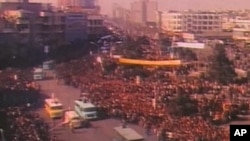On Friday Iran will mark the anniversary of its Islamic revolution. Thirty-two years on, world leaders are reassessing their relations with Egypt in the wake of the anti-government protests there, with some wondering whether it will follow a similar path to Iran. But many observers say the Egyptian protesters are not motivated by religion.
Just what is the motivating force driving the millions of protesters on the streets of Egyptian cities - and where will it all end? They are questions on the minds of many world leaders.
Some analysts say history is repeating itself - the start of an Islamic revolution in Egypt, just like Iran in 1979.
But many who’ve witnessed the protests first-hand disagree.
“This is not an Islamic takeover," said Shiraz Maher, of the International Center for the Study of Radicalization in London, who has just returned from Cairo. "I was in Tahrir Square doing research for our office here and really when you speak to those guys, they’re clear that this is about very basic things. It’s about human rights, it’s about freedom, about liberty and reclaiming their dignity as Egyptians.”
At first glance the scenes of protest and violence in Egypt are strikingly similar to the newsreels of 1979 from Iran.
Then, anti-government demonstrations gained momentum and spawned violent street battles, as the U.S.-backed Shah monarchy was swept from power. Iran was declared an Islamic republic under Ayatollah Khomeini.
Iranian-born analyst Hazhir Teimourian was a journalist covering the Iranian revolution for international media. He says there are ominous parallels between those events and what’s now unfolding in Egypt.
“The Iranians told themselves that, ‘Nothing worse can happen to us, we want the Shah to go and then we will agree among ourselves about the succeeding government.’ The Egyptians are making the same mistake and unfortunately things can go wrong," he said. "Unfortunately they are not united, apart from wanting to see the back of Mubarak.”
No single opposition group in Egypt has majority support.
The Muslim Brotherhood remains the most powerful; they say they do not seek power, nor an Islamic takeover in Egypt.
Shiraz Maher, of the International Center for the Study of Radicalization, says America and the West should have been quicker to back the protesters.
“People are starting to become despondent," he said. "They are saying, 'Where are the kinds of values and freedoms that you want to hold for yourselves but suddenly it’s not good enough for Egyptians?' And so inevitably I think if people are going to feel betrayed, if people are going to feel ‘It’s good enough for you but it’s not good enough for us’ or ‘We’re always going to be distrusted because we’re Arab or Muslim’, then that ultimately will play into the hands of Islamist groups.”
Maher says there is a well-established network of radical Muslim groups in Egypt. But the protesters have not looked to them for leadership.
That’s in contrast to Iran - where the Ayatollah Khomeini was the figurehead of the protests.
Analyst Hazhir Temourian remains pessimistic for Egypt’s long-term political future.
“We expect the population of Egypt to increase from 85 million now to 120 million by the middle of this century," he said. "A whole third of them are under 15. Sixty percent of the people of Egypt are under 30. I think that no mode of governance, clean and democratic or religious or whatever, is going to answer the rising expectations of that many young people.”
Teimourian says that’s a situation facing governments across the developing world - and the uprising in Egypt is likely to be repeated far beyond its borders.




